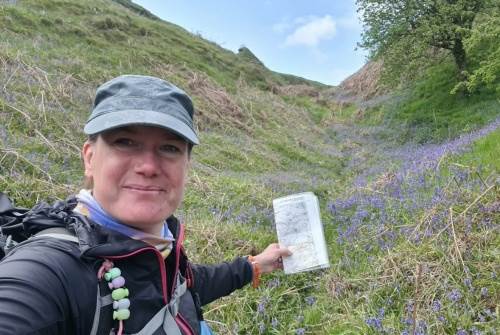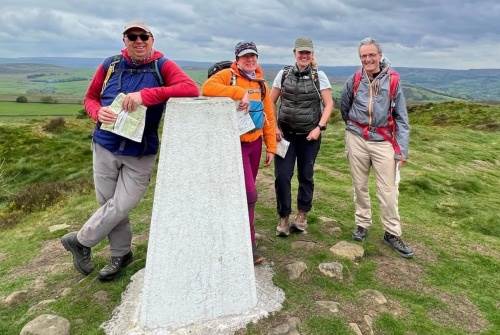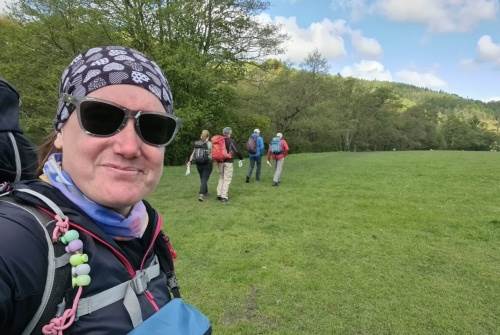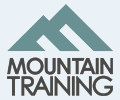Amy Baron-Hall - Hill and Moorland Leader

Tell us a bit about yourself
I live in the Peak District with my partner and my dog, we moved here ten years ago for my partner’s job and love living here. I currently work part time as an Active Travel Officer in Sheffield, working with schools to get pupils out of cars and travelling actively to schools.
How do Autism, chronic fatigue syndrome/myalgic encephalomyelitis affect you day to day?
It varies day to day, but with the CFS/ME I have to think about what I ‘spend’ energy on so have to balance things carefully. I also need a lot of sleep, so it is normal for me to be in bed at 8pm and I find doing anything in the evening difficult. Due to my Autism I’ve never really felt I have fitted in so anything social I find difficult and takes a lot of energy.
How and when did you start hill walking?
I was hill walking before I was born, my parents walked the coast to coast in Scotland while my mum was pregnant with me. They then took me into the hills from when I was about 6 months old. This stopped after they had my sister but I was part of a really active Guide Group as a teenager and we went hill walking at least once a month, mainly in the Peak District but also to the Lake District, as well as camping a few times a year. In my 20’s I got into mountain biking, mainly as a way of going further in the hills, but always did some walking. We got our first dog nine years ago and I really got back into exploring the hills on foot with him, we loved spending days out exploring areas with less people.
My favourite walking companions are my dogs, they are always keen to get out and happy to go where I choose (although I let them choose the route sometimes), it’s also nice to go with my partner as it’s nice to have time together as often life is so busy. I enjoy solo walks as well where I barely see anyone as a time to reset myself and help myself cope with life. I’ve always struggled in group situations when I’m just a group member and don’t really have a role so I don’t tend to go out in groups.
How did you find out about Mountain Training qualifications/Hill and Moorland Leader?
I’d vaguely been aware of them for a while from knowing of people who had done their Mountain Leader, but it was my partner who gave me the push to find out more. I’d felt they were for people who were really strong in the mountains and super fit, she knew people who had done the Mountain Leader and felt I was more than capable. I mainly researched online and I choose to do the Hill and Moorland Leader as I have great access to the correct terrain, living where I do, and also it was easier to get to other hill and moorland areas by public transport, I find driving really tiring and it’s something that triggers my fatigue. I also felt I could look after a group in that terrain, whereas although I feel I can look after myself in mountain terrain I’m not necessarily sure I have the spare capacity for looking after a group.

Were you confident from the outset that it would be achievable?
Not at all! When I first looked it was at the Mountain Leader qualification and I didn’t think I could do six days of a course in a row, also I would struggle to do all the travelling required and that it was for very fit and experienced mountaineers. The Hill and Moorland Leader felt more achievable but I was still very worried about the three long days for the course and specifically the night navigation as I deal with a lot of my fatigue issues by being in bed at 8pm every night. I also cannot visualise things in 3D and have been told in the past that I would never be good at navigating, so although I have successfully navigated myself for years in the hills I felt as though I couldn’t look at a map and know what to expect; I couldn’t get to that high standard required.
Gaining the Quality Hill Days needed were mainly done by public transport, unless they were local to home, which meant that I didn’t have issues with the driving causing fatigue. I enjoy wild camping so I would catch the train to an area and walk and camp for a few days. I did a lot of my night navigation practice as part of these trips during the winter when it gets dark earlier and so I wasn’t having to then travel home late. These trips also allowed me to get used to doing three days together. I was lucky enough to be able to book on a course that was based two miles from home, so I didn’t have to worry about travel and my partner was able to collect me if needed after the night navigation session. I also chose to do my training in October when hopefully it got dark earlier.
Although I only work part time and have a very supportive home life so I have plenty of time, I also need a lot of rest to cope with CFS/ME so it is hard to always guarantee I can get out and do a full day in the hills. However living in the Peak District I do have great access to the hills so I tried to make sure I had the required number of QHD’s before booking training/assessment so that there was no pressure to get the days in a set period of time.
I get really anxious about going new places so I also chose the training provider due to knowing exactly where they were and I had done a first aid course previously there so had some familiarity.
Did you discuss your Autism/chronic fatigue/ME with the course provider before either the training or assessment course?
Due to my Autism I have Aural Processing Disorder which means that I can struggle when all directions are given verbally and can take time to process everything. I did contact my training provider before training about my various issues and they were reassuring there wouldn’t be an issue. The trainer I had was very good and I could notice him checking on me, but in a way that wasn’t obvious. I realise now that although I did contact them before my assessment and ask some questions, that I needed to be clearer about my issues, something I struggle to do.
How was the training course?
The training course was a really good three days, I struggled on the final day after we got off the hill late on the second day after night nav. I felt it showed me that I had been working on the right aspects in the lead up. The feedback I got was really good, although surprising, as it was all very positive and that I was strong in areas I had felt I was weak in. I was told to keep getting out and practising and I should be fine for assessment.
How did you find the consolidation period?
As a member of the Mountain Training Association I went on a few workshops and through that I joined up with some other trainees to get out in the hills together. One in particular was a great support and cheerleader. I also went on two weekends with the AM Collective, set up by Harriet MacMillan, for women who had done their training and were in their consolidation period. These were a really support environment and Harriet was great at ensuring I could join the weekends and feel comfortable. I also was lucky enough to get to shadow one of Harriet’s navigation courses and another local navigation course.

How was the assessment course?
I really struggled on assessment, partly I think it was being under assessment so I didn’t trust myself at all and got myself a bit caught up on being perfect with navigation. But also, every instruction was given verbally and I feel I did struggle to process it all which meant that I wasn’t always sure that I was heading to the right place or just where I had processed the point to be. I did my assessment in May which meant the night navigation was really late and although I had asked about it prior to assessment, the plan for it changed and we were only told of that on the day. Unfortunately, this meant I had to arrange transport to the new location we were meeting at which caused some stress, even though my partner was happy to do so. I certainly need to work on my ability to cope on assessment before future ones.
What’s your plan for using the qualification?
I hope to work with young people, particularly those for whom there are barriers to access the outdoors. As a young person I didn’t get to go on school trips etc due to being Autistic (although undiagnosed due to the issues and behaviour I displayed) and I don’t think anyone should be excluded or told it isn’t for them.
What do you know now that you wish you’d known at the start of the process?
That you don’t have to be perfect at every aspect, although my black and white thinking still struggles with this.
Quickfire questions:
Favourite place to go for a walk: From my front door and up onto Froggatt and Curbar Edges early morning before they are busy.
Won’t go walking without: Usually my dog, unless its too hot.
Best hill walking memory: Waking up on a wild camp at 4am to most amazing pink skies.
Worst hill walking memory: Freezing rain falling and turning everything to ice, including the ground so it was an ice rink, and freezing all the zips on my coat and pack!
Game changing piece of kit: Controversial but my phone, always have a camera and back up to check I’m where I think I am.
Favourite season to walk in: Autumn.

Support from Mountain Training
It’s always lovely to hear about folk gaining our qualifications. Not everyone enjoys being assessed though and that’s ok. Our providers will do their upmost to make sure your assessment is as relaxed as possible but they have a tricky job to do and you can help them to make sure they get the best from you.
It’s worth chatting through the assessment process with course staff during your training course to gain an understanding of the expectations upon you. As they know the scheme, and you know you, you’ll likely come away with lots of ideas to enable you to perform at your best. If you get tired undertaking late ‘night navs’ like Amy, for example, an assessment in the early spring or late autumn might be the way to go?
If you need more specific support during the course to demonstrate competence, it’s best you give the provider a ‘heads up’ in advance. For example if, like Amy, you’d prefer tasks to be presented in a certain way, your provider might be able to accommodate that – get in touch before the course starts to discuss your needs. Given the practical nature of our schemes and commonly challenging and remote environments, it’s not always possible but our providers really will do their best! It’s worth reading our
Support for people with additional needs page which gives more information, and if you’re unsure, do get in touch with us directly:
info@mountain-training.org